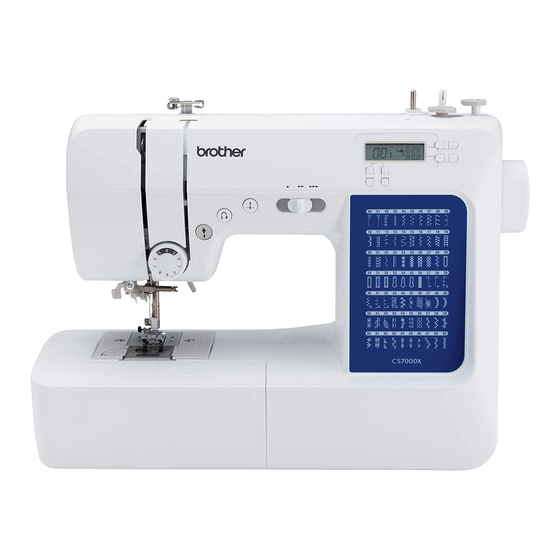Brother 888-N00 Operation Manual - Page 12
Browse online or download pdf Operation Manual for Sewing Machine Brother 888-N00. Brother 888-N00 32 pages.
Also for Brother 888-N00: Operation Manual (32 pages)

Fabric/Thread/Needle Combination
• Needles that can be used with this machine: Home sewing machine needles (size 65/9 - 100/16)
* The larger the number, the larger the needle� As the numbers decrease, the needles get finer�
• Thread that can be used with this machine: 30 - 90 weight
* Never use thread of 20 weight or lower� It may cause machine to malfunction�
* The smaller the number, the heavier the thread� As the numbers increase, the thread gets finer�
• The machine needle and thread that should be used depends on the type and thickness of the fabric� Refer to
the following table when choosing the thread and needle appropriate for the fabric that you wish to sew�
- The combinations shown in the table provide a general guideline� Be sure to sew trial stitches on the actual
number of layers and type of fabric to be used in your project�
- The machine needles are consumables� For safety and best results, we recommend replacing the needle
regularly� For details on when to replace the needle, refer to "Checking the needle" (page 13)�
• In principle, use a fine needle and thread with lightweight fabrics, and a larger needle and heavier thread with
heavyweight fabrics�
• Select a stitch appropriate for the fabric, and then adjust the stitch length� When sewing lightweight fabrics,
make the stitch length finer (shorter)� When sewing heavyweight fabrics, make the stitch length coarser (longer)�
(page 15)
When sewing stretch fabrics, refer to "Sewing guide" (http://s�brother/cmkag/)�
Fabric Type/Application
Lightweight
Lawn, georgette, challis,
fabrics
organdy, crepe, chiffon, voile,
gauze, tulle, lining, etc�
Medium weight
Broadcloth, taffeta, gabardine,
fabrics
flannel, seersucker, double
gauze, linen, terry cloth, waffle
weave, sheeting, poplin, cotton
twill, satin, quilting cotton, etc�
Heavyweight
Denim (12 ounces or more),
fabrics
canvas, etc�
Denim (12 ounces or more),
canvas, tweed, corduroy, velour,
melton wool, vinyl-coated
fabric, etc�
Stretch fabrics
Jersey, tricot, T-shirt fabric,
(knit fabrics, etc�)
fleece, interlock, etc�
For top-stitching
n Transparent nylon thread
Use a home sewing machine topstitching needle, regardless of the fabric or thread�
n Sewing decorative stitch patterns (needles and threads)
When sewing lightweight, medium weight or stretch fabrics, use a ball point needle (gold colored) 90/14� When
sewing heavyweight fabrics, use a home sewing machine needle 90/14�
In addition, #50 to #60 thread should be used�
• The appropriate fabric, thread and needle combinations are shown in the preceding table� If the
combination of the fabric, thread and needle is not correct, particularly when sewing heavy fabrics
(such as denim) with thin needles (such as 65/9 to 75/11), the needle may bend or break� In addition, the
stitching may be uneven or puckered or there may be skipped stitches�
12
Thread
Type
Weight
Polyester
60 - 90
thread
Cotton thread,
50 - 80
Silk thread
Polyester
60 - 90
thread
Cotton thread,
50 - 60
Silk thread
Polyester
thread,
30
Cotton thread
Polyester
60
thread
Cotton thread,
30 - 50
Silk thread
Polyester thread,
Cotton thread,
50
Silk thread
30
Polyester thread,
Cotton thread
50 - 60
★
CAUTION
Stitch length
Size of needle
mm (inch)
Fine stitches
65/9 - 75/11
(1/16 - 3/32)
Regular stitches
75/11 - 90/14
(1/16 - 1/8)
100/16
Coarse stitches
(3/32 - 3/16)
90/14 - 100/16
Ball point needle
Setting appropriate for
75/11 - 90/14
the fabric thickness
90/14 - 100/16
Setting appropriate for
the fabric thickness
75/11 - 90/14
★
: Only for some models�
1�8 - 2�5
2�0 - 3�0
2�5 - 4�0
